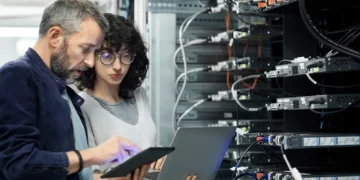- From an economic perspective, offering free education could cultivate a more skilled and adaptable workforce.
- Global cooperation, targeted investments, and comprehensive policy frameworks are essential to ensure universal access to high-quality education accessible to all.
- As automation and AI transform industries, a workforce with access to continuous free learning and training will be better equipped to adapt to new technologies.
What if we stopped limiting our views of what the Future of Work can be? In our What if…? Series, Allwork.Space is letting imagination run wild to explore what the world of work might evolve into, if we don’t limit ourselves with the trappings of the past. In these articles we explore how we might move into the future of work, and the impact those imaginings could have on those who want to thrive in it.
Have a wild idea that you are curious about? Shoot a note to [email protected] with the subject line “What if…?” and we’ll dive in.
Education has been called the great equalizer, and in the world of work it has an easily quantifiable impact.
In the U.S., 77% of jobs with a salary above $35,000 per year require a college degree; however, two-thirds of the population lack this level of education — creating a significant barrier to financial advancement for about 80 million people.
The American Civil Liberties Union (ACLU) argues that universal access to quality education is essential for achieving systemic equality by breaking down entrenched barriers and offering equal opportunities for success.
What if in the Future of Work all training and higher education were free?
The concept of free education and training for all, no matter how out of reach it may seem, has the potential to transform the workforce and society.
By equipping individuals with the skills needed in the rapidly advancing technology and digital sectors, specialized learning initiatives can drive economic transformation and increase socio-economic mobility.
In an Allwork.Space podcast, Lisa Gevelber, founder of Grow with Google, emphasized how education and training programs can enhance the workforce’s capabilities.
Gevelber stresses that affordable or free education, coupled with continuous skill development, could be a game-changer for ensuring workers remain competitive in future job markets.
Current Corporate Commitments
Educational institutions and companies are increasingly “stepping up” to address the growing skill shortages through targeted training. Whether via in-house initiatives or partnerships with educational platforms, these efforts aim to prepare employees for evolving industry demands.
For example, U.S. community colleges are launching AI-focused training programs, supported by a $2.8 million National Science Foundation grant, to equip students with the skills needed for an AI-driven economy.
Italian companies are creating in-house training programs to fill specialized roles in digital/AI sectors and predicted future job sectors. These tailored skill development initiatives also play a role in addressing the issue of an aging population and low employment rates.
Meanwhile, in the U.S., Papa John’s has partnered with a learning platform to provide free education to all its employees, covering degrees, certifications, and career advancement opportunities. This initiative removes financial barriers and empowers employees to pursue their career goals.
Platforms such as Udemy aim to make education more inclusive by offering affordable online courses in various fields. These digital platforms show how scalable solutions can expand access to education globally, enabling individuals to acquire new skills regardless of their financial background.
In the U.S., the Biden-Harris administration emphasized the need to train the next generation of workers — particularly in underserved communities — for critical sectors like climate change. States like California are investing $60 million in workforce development to create climate-ready jobs, with educational programs focused on renewable energy, water management, and other green industries.
Level the Playing Field Through Inclusive AI
High-quality and accessible free education could drive advancements in technology, engineering, and science — enhancing global competitiveness. However, such a large-scale initiative would challenge traditional education models that still struggle with internal inequities.
AI4ALL is a non-profit organization dedicated to promoting diversity and inclusion in AI. Its mission is to equip historically excluded students with the skills, networks, and opportunities necessary to become leaders in the field.
Emily Reid, AI4ALL’s Chief Executive Officer, said that AI, inherently shaped by its creators, can perpetuate biases if developed by a homogeneous group. She argues that AI systems must reflect diverse perspectives to avoid reinforcing disparities.
A diverse and inclusive workforce is essential to ensure that AI technology serves all communities equitably. Reid believes that accessible, high-quality AI education is central to this vision.
Free training programs can break down barriers that have historically excluded underrepresented groups from the tech industry, empowering individuals with the skills and opportunities needed to succeed.
Reid states, “This inclusivity fuels technological advancement and strengthens communities by creating pathways for economic growth and career advancement across all demographics.”
Reid also stresses that preparing a global workforce for the future requires more than just technical skills. It calls for an inclusive, lifelong approach to education that promotes adaptability, creativity, and ethical awareness.
She believes that as technology rapidly evolves, it is essential to equip individuals from all backgrounds with the mindset and capabilities needed to adapt and thrive in an AI-driven world.
Dr Shawn DuBravac, New York Times bestselling author and top 30 futurist, also argues that universal access to education — enabled by technology — is vital for adapting to fast-changing job markets and supporting both personal career growth and broader economic progress.
Like Reid, DuBravac believes that technology is already making education more accessible. He highlights how the latest innovations, including AI-driven personalization and remote learning, break down traditional barriers, allowing lifelong learning to reach anyone, anywhere.
“As automation and AI reshape job requirements, the ability to continuously learn and adapt becomes essential. Tech-enabled education supports this by offering modular, just-in-time learning, which provides individuals with the flexibility to acquire new skills as industries and technologies change,” DuBravac said. “This not only benefits individual career resilience but also strengthens the economy’s capacity to innovate, filling emerging skill gaps and fostering a workforce that can adapt to — and even drive — the next waves of technological change.”
Potential Challenges and Considerations
While providing free, accessible education for all is a noble goal, there are significant challenges to its successful implementation as a global policy:
- Inequality and Accessibility: Marginalized groups — such as children from low-income households, rural areas, or those with disabilities — often face additional barriers to learning opportunities. These barriers may include inadequate infrastructure, cultural obstacles, and a lack of support systems.
- Quality of Education: In many regions, education remains underfunded and lacks essential resources, including qualified teachers, learning materials, and proper facilities. As a result, students often receive subpar education that leaves them ill-prepared for the demands of the modern workforce.
- Financial Constraints: Governments, particularly in low-income countries, struggle to fund universal education due to limited resources. Economic challenges, including poverty and competing national priorities, often divert funds from education, further limiting access to quality learning.
- Political and Policy Barriers: Political instability, a lack of will and well-designed initiatives, poor governance, and a misalignment between national policies and local needs pose significant obstacles to the effective expansion of free education programs.
- Social and Cultural Factors: Societal norms and cultural attitudes can further limit access to education. In some regions, girls, children with disabilities, or children from marginalized communities face additional obstacles, such as early marriage or a lack of facilities designed to accommodate their needs.
Global cooperation and commitment, targeted investments, and comprehensive policy frameworks are essential to address these challenges and ensure a modern, first rate standard of education is accessible to all.
Implications for the Future of Work
Free higher education and training could reshape the future of work by eliminating financial barriers. What are the potential implications for individuals, organizations, and wider society?
1.Democratization of Skill Development
Free education would break down financial barriers, allowing individuals from all socio-economic backgrounds to acquire the necessary skills. This democratization could lead to a more skilled, adaptable, and inclusive workforce. With continuous access to training, individuals could upskill regularly and remain relevant in a rapidly changing job market.
2.Economic Growth and Productivity
An educated workforce can drive innovation and productivity, ultimately contributing to economic growth. Furthermore, free access to education could encourage entrepreneurship and technological progress by equipping individuals with essential skills. Free education can also help reduce unemployment and boost economic performance by filling essential skills gaps in the workforce.
3.Reduction in Socio-Economic Inequalities
Free education has the potential to reduce socio-economic disparities and serve as a catalyst for upward social mobility. However, its success in this regard is more likely in countries with smaller wealth gaps. A report from the World Economic Forum notes that in nations with a significant rich-poor divide, universal education may push affluent students toward elite private institutions, exacerbating social stratification. Research also shows that while education is essential, social capital — networks, relationships, and opportunities — often plays an equally important role in advancing individuals’ careers.
4.Improved Adaptability to the Changing Nature of Work
As automation and AI transform industries, a workforce equipped with ongoing education and training will be more able to adapt to new technologies. The European Centre for the Development of Vocational Training predicts that by 2035, economies will become increasingly skills-intensive, with the service sector growing significantly. Free education could support this trend by providing workers with the required skills to fill these positions in the future.
5.Development of Talent Pipelines for Organizations
Organizations would benefit from a larger pool of skilled candidates, potentially reducing costs associated with basic training and boosting overall productivity. However, companies would still need to invest in advanced training programs to cultivate specialized talent and ensure a steady pipeline of skilled workers for the future.
6.Global Perspectives and Comparisons
Examining countries with free or heavily subsidized education systems, such as the Nordic countries, can offer valuable insights into the benefits and challenges of universal education. By analyzing these models, policymakers can learn from the successes and challenges these countries have faced in providing free education.
7.Environmental and Societal Benefits
Free education aligns with several Sustainable Development Goals (SDGs), including advancing inclusive and equitable quality education and promoting lifelong learning opportunities for all. Moreover, universal access to education can promote greater community tolerance, drive societal progress, and create a more informed, engaged global citizenry.
The Power of Free Education and Social Capital
Adnan Rasool, Associate Professor at the University of Tennessee at Martin, believes that one of society’s greatest challenges is the financial barrier to education, which limits upward mobility for so many individuals.
Without access to education, people are often trapped in low-paying jobs with few opportunities for advancement, perpetuating a cycle of survival rather than progress. Rasool argues that while free education is essential for skill development, its real value emerges when it supports the development of social capital.
Access to social capital could equip previously disadvantaged communities with the tools required to build connections, enhance communication skills, and gain knowledge that increases their competitiveness in both professional and social contexts.
As experts continue to explore the far-reaching implications of universal (free) education, it is clear that its benefits could extend well beyond individual career and workforce development, ultimately transforming the global economy and society as a whole.

















